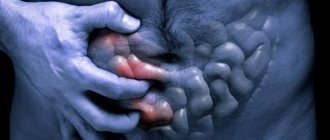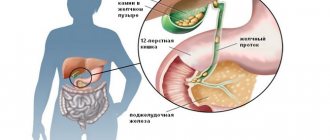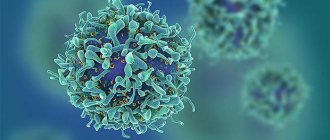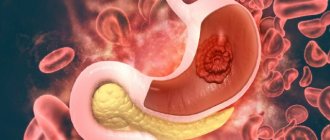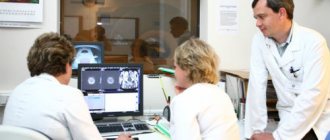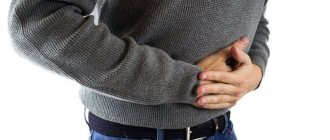The text is presented for informational purposes only. We strongly urge you not to self-medicate. When the first symptoms appear, consult a doctor. We recommend reading: “Why you can’t self-medicate?”
Colonoptosis is prolapse of the colon. The colon is attached to the posterior wall of the abdominal cavity by means of ligaments, which, when weakened or partially torn, sag. Violation of normal spatial orientation changes the functioning of the intestine, its motility and causes symptoms of partial obstruction and fecal intoxication.
Symptoms of rectal prolapse
At an early stage, rectal prolapse hardly manifests itself at all. Over time, progressing, the disease manifests itself with the following symptoms:
- Pain during bowel movements
- Inability to have a bowel movement without straining excessively
- Feeling of incomplete bowel movement
- Inability to go to the toilet without laxatives or enemas
- Frequent false urge to have a bowel movement
- Feeling of a foreign body in the anus
- Mucus or bloody discharge from the anus (if there has been trauma to the rectum)
Please note: if you already have at least one of these symptoms, it means that rectal prolapse is progressing and sooner or later will lead to even more serious complications (for example, ulcers or infections), which are very difficult to treat. To avoid this, it is important to diagnose diseases in time and take the necessary measures. Only an experienced doctor can do this. Therefore, do not self-medicate, which will not help you anyway. Make an appointment with our specialists.
Causes of rectal prolapse
Rectal prolapse is caused by weakening of the pelvic floor muscles. This weakening is usually based on several reasons, among which may be:
- Congenital incompetence of the pelvic muscles
- Age-related weakening of the pelvic floor muscles
- Frequent and prolonged constipation
- Difficult birth with injuries
- Too long labor
- Late labor
- The habit of sitting on the toilet for a long time, which is formed in childhood
- Severe straining during bowel movements
- Severe cough due to various diseases of the lungs and upper respiratory tract: (bronchitis, pneumonia, influenza)
- Obesity or sudden weight loss
- Heavy physical work involving heavy lifting
Symptoms of colonoptosis
Doctors of Tibetan medicine believe that the symptoms
indicate
intestinal prolapse:
aching pain in the pelvic area, lower abdomen
long-term constipation
flatulence
· bloating
· in people whose natural “dosha” is “mucus” there may be swelling of the face, legs, chronic or allergic rhinitis
· in patients with the natural “dosha” “bile”, heartburn, increased blood pressure, unstable stools, and increased irritability appear
· thin, restless asthenics with a natural “dosha” “wind” experience pain in the stomach area, especially after stressful situations, regular constipation, belching, hemorrhoids and varicose veins
Degrees of rectal prolapse
- I degree: as a rule, there are no unpleasant sensations, but examination may reveal a slight protrusion of the rectum
- II degree: there are already difficulties, pain and discomfort during bowel movements, rectal prolapse is visually observed
- III degree: in addition to pain, discomfort and difficulties during defecation, there is a painful urge to empty the bowel, a feeling of incomplete evacuation, bleeding from the rectum occurs, anal fissures and ulcers of the mucous membrane develop
Prevention of rectal prolapse
A healthy lifestyle, professional pregnancy management and competent delivery – all this greatly reduces the risk of prolapse of the rectum and other organs. A balanced diet plays the most important role: you need to eat more foods high in fiber (fruits, vegetables, herbs), do not overuse fried, smoked, too hot or spicy foods, do not eat processed foods and do not snack on the run. It is important to promptly treat diseases of the lungs and upper respiratory tract that cause severe coughing, as well as diseases of the gastrointestinal tract, among which constipation plays a leading role. It is equally important not to bother yourself with excessive physical activity, which over the years leads to weakening of the pelvic muscles and, as a result, prolapse of the internal organs.
What is gastroptosis?
Stomach prolapse is gastroptosis
Gastroptosis does not have a significant effect on the digestive processes; constipation occurs only in particularly critical cases, with the development of the 3rd degree of the disease.
Causes of gastroptosis
Pathology can be:
- congenital
- acquired.
Acquired prolapse of the stomach occurs due to asthenia of muscle tissue, sprain of the ligaments that hold the organ. Such a weakening can be caused by:
- fast weight loss,
- surgical intervention in the abdominal cavity,
- childbirth (women)
- vitamin deficiency, lack of protein in the diet
Women of childbearing age suffer from this disease more often than others, since pregnancy often provokes this pathology. One of the reasons for such a frequent occurrence of this pathology during the childbirth period is that many women (some out of ignorance, some out of thoughtlessness) do not wear a bandage that supports the fetus during this period. As a result, the ligaments holding the stomach and other organs are stretched.
Gastric prolapse can be complete (when the entire organ prolapses) or partial. Moreover, partial prolapse is much more common. Partial gastroptosis (anthropyroptosis) is characterized by lengthening of the cavity, as a result of which the intestines descend downwards. With complete gastroptosis, the diaphragm descends first, which pulls the stomach down. Similar pathologies of the diaphragm and stomach can result from pulmonary pathologies such as pleurisy or emphysema. As it descends, the severity of the patient's condition is determined.
When prolapse occurs, compression occurs on the underlying organs, and in particular the pelvic organs, which leads to circulatory problems. And this causes menstrual irregularities, the development of diseases such as fibroids and endometriosis in women, and prostatitis in men. Gastroptosis can also cause the development of hemorrhoids.
Diagnosis of rectal prolapse
When there is prolapse of the rectum and other organs (uterus, vagina, bladder), it is important to understand what led to the weakening of the pelvic muscles, determine the degree of prolapse, assess the condition and functioning of neighboring organs, and exclude infections and inflammation. That is why a comprehensive diagnosis is important.
- History: when did abdominal pain and discomfort during bowel movements appear, a feeling of incomplete emptying, constipation and bleeding from the rectum, what diseases are there, have there been any surgeries, have any of your close relatives suffered from rectocele or other diseases of the gastrointestinal tract
- Palpation of the abdomen and rectum
Laboratory diagnostics:
- Blood tests (biochemical and clinical) - help identify anemia, which often accompanies rectal prolapse, inflammatory reactions, liver, pancreas and kidney diseases
- Fecal occult blood test - if there is a suspicion of occult bleeding in the intestines
- Coprogram - a stool analysis that helps assess the efficiency of the intestines
Instrumental diagnostics:
- Dynamic defecoproctography (x-ray of the intestine during bowel movement) - helps to identify possible damage to the musculo-ligamentous apparatus
- Sigmoidoscopy (visual examination of the rectum and some parts of the sigmoid colon using an endoscope) - helps to accurately diagnose rectal prolapse even at the earliest stage
- Colonoscopy – helps to identify colon pathologies
- CT scan – helps evaluate the condition of the liver, pancreas, bladder, kidneys and identify possible complications
- Ultrasound of the abdominal cavity and pelvis - helps to assess the condition of the gallbladder, biliary tract, pancreas, kidneys, intestines and determine fecal retention in the intestines
To exclude or confirm prolapse of other organs (uterus, vagina and bladder), your doctor will refer you to a gynecologist and urologist for consultation.
Treatment of rectal prolapse
Many people turn a blind eye to the symptoms of rectal prolapse and get used to living with them. This is a dangerous attitude, fraught with big problems in the future: after all, if prolapse has begun, it will only progress and get worse and sooner or later will lead to complications that will irreversibly ruin your health and quality of life. Rectal prolapse must be treated. How exactly will be determined by your attending physician based on the results of a thorough preliminary diagnosis. Treatment can be conservative and surgical. Surgery is prescribed when other - non-operative - treatment methods do not produce results.
Non-traditional methods of treating gastroptosis
Tibetan medicine
Vacuum cans can be considered among the unconventional methods. These are soft rubber jars that vaguely resemble small oven pots. By sucking to the stomach, they improve blood circulation in the skin, and at the same time, affect the tone of the stomach ligaments. This is how Tibetan monks treat prolapsed stomach.
Tibetan jars have nothing in common with glass jars, which until recently were used for colds. And don't try to experiment. Even 30 years ago, doctors noticed that the craze for glass jars had a negative effect on the cardiovascular system. Rubber jars are placed on the stomach area; for this you do not need to light anything in them. The jar is compressed into an accordion and the air is removed from it. And when the doctor places it on the patient’s stomach, it easily suctions.
Traditional medicine in the treatment of gastroptosis
Where traditional medicine is powerless, folk medicine can help. Here are some recipes:
- Finely chop a small head of cabbage and boil it. Pour the broth into a separate bowl, drink it instead of water throughout the day, and use the cabbage in some salad or other dish.
- Pour two teaspoons of St. John's wort into a glass of boiling water, cover and let it brew for half an hour. Then strain. You should drink it in 3 doses throughout the day.
- A dried mixture of the herbs wormwood, centaury, and dandelion roots, chicory and calamus is taken at the rate of 1 tablespoon per glass of boiling water. It is better to insist in a thermos for half an hour. Drink 50 ml half an hour before meals. This composition will promote the production of gastric juice in the stomach and improve appetite.
As with any other disease, gastroptosis is also worth fighting and not losing hope for a healthy life - everyone can choose their own treatment method that will bring the desired result. The main thing is to believe!
Conservative treatment of rectal prolapse
Bandage A special device that holds the pelvic organs, intestines and rectum in a normal anatomical position. The attending physician selects the bandage based on the degree of prolapse and your individual characteristics. It is very important to use the bandage correctly: it should only be put on and taken off while lying down. Therapeutic massage Performed only by a specialist. Helps strengthen the pelvic floor muscles and, as a result, return the rectum to its normal position.
Special gymnastics Restores the tone of the pelvic muscles and returns the lowered organs to their normal position. It is carried out at home. It is important to receive training from a specialist who will show you how to do the exercises. Diet It is necessary to exclude foods that cause gas and constipation. The diet that is right for you will be selected by a nutritionist, to whom your attending physician will refer you. Medications It is important not only to remove the cause of the disease, but also to relieve unpleasant symptoms that spoil the quality of life. Various painkillers and laxatives will help with this, which the attending physician will select individually based on the intensity of their manifestation, your intolerance to certain medications and the general condition of your body. When these treatments do not help and your condition worsens, your doctor will refer you for surgery, which will allow surgeons to fix your rectum in the correct anatomical position. The surgical technique is selected depending on the degree of prolapse, the presence or absence of prolapse of other organs, concomitant diseases, your general condition and a number of other factors.
Classification
The classification is simple, reflects the anatomical features of the prolapse:
Medicines (drugs, medicines, vitamins, dietary supplements) are mentioned for informational purposes only. We strongly do not recommend using them without a doctor's prescription. We recommend reading: “Why can’t you take medications without a doctor’s prescription?”
- right-sided colonoptosis - the right side of the colon is prolapsed;
- left-sided – left is lowered;
- total – both sections are displaced.
The condition is differentiated from dolichomegacolon , when the intestine of excess length sags. With ptosis, the length of the intestine and its parts is normal, physiological, only the position in the abdominal cavity is disturbed.
Surgical treatment of rectal prolapse: why in the Stolitsa network of clinics?
A complex approach
To understand what is causing the weakening of the pelvic muscles in you and to develop the correct tactics for surgical intervention, we conduct a comprehensive diagnosis, involve related specialists (urologist, gynecologist, nutritionist) to clarify the diagnosis and select a surgical intervention technique based on the degree of prolapse and pathologies of neighboring organs , your age and a number of other important factors.
Modern operating unit
Two operating rooms and an intensive care unit are equipped with high-tech premium surgical equipment, thanks to which we successfully perform various operations for prolapse of the rectum and other organs and return you to health, regardless of the complexity of your case.
First class surgeons
Even high-tech equipment without good surgeons is just a device. Over the years of successful practice, our specialists have performed a huge number of operations and helped hundreds of people return to a full life. When contacting us, remember: we will thoroughly understand your situation, perform the operation that is necessary for you, and help you recover.
Modern operations
High-tech surgery using mesh implants is the most effective method of treating rectal prolapse. The operations are performed without general anesthesia, are virtually painless and help to carefully fix the rectovaginal septum and remove rectal protrusion. The modern fixing meshes (implants) that we use have a unique pattern, thanks to which they can be secured to the pelvic ligaments and reliably fix the rectovaginal septum. Please note: implants are absolutely safe and do not cause infections, since they are chemically inert when in contact with body tissues.
After operation
After the operation, you will be transferred to a cozy 1- and 2-bed ward with everything you need, where you will be comfortable and comfortable, and our specialists will closely monitor your condition. The rehabilitation period directly depends on the type of surgery performed and varies from a day to several days.
Contraindications to surgical treatment of rectal prolapse
There are several conditions and pathologies in which surgery cannot be performed:
- Progressive diseases of internal organs
- Acute cardiovascular diseases
- Various infectious diseases
- Inflammatory diseases of the genital organs
- Poor blood clotting
- Venereal diseases
- Tendency of tissues to become excessively scarred
- Progressive diabetes mellitus
How much surgical treatment is necessary and possible in your case will be determined by our specialists based on the results of preliminary diagnostics. Please note: timely diagnosis of rectal prolapse is the key to successful treatment, because the earlier this pathology is identified, the simpler and easier it is to remove it. If you are concerned about any symptoms associated with bowel movements, be it pain, constipation, spotting or anything else, do not waste valuable time and money on self-medication. Make an appointment with our specialists right now.
Causes of the disease
Specialists who are actively studying the elongation of the sigmoid colon cannot say with certainty about the causes of this defect. Among the predisposing factors for the development of the congenital form of the disease, the following should be highlighted:
- genetic predisposition;
- use of drugs by a woman carrying a child;
- unfavorable environmental conditions;
- infectious pathologies transmitted during pregnancy.
The acquired form of the disease is diagnosed much less frequently. Usually detected in adults aged 45 years. In this case, the predisposing factors are an inactive lifestyle, abuse of heavy foods with large amounts of carbohydrates, impaired digestion of food and regular stress.
